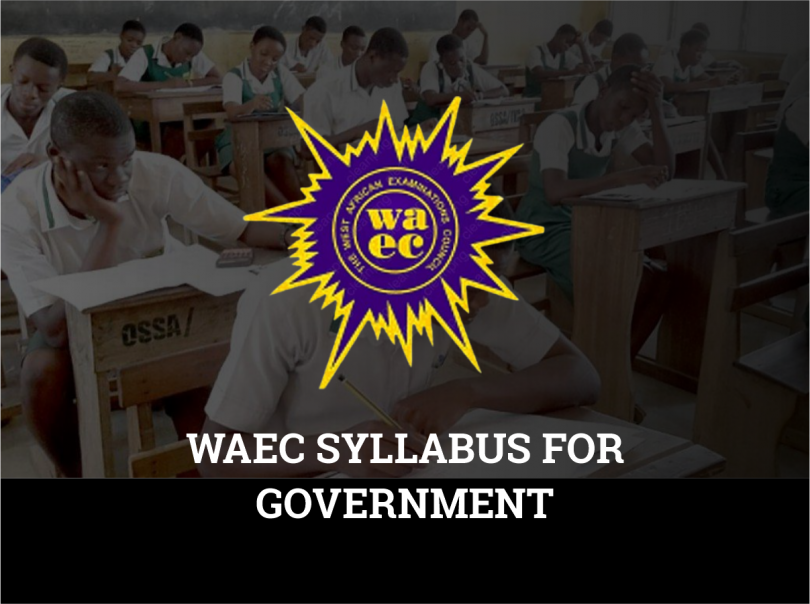The West African Examinations Council (WAEC) has released the official syllabus for the Government subject, which is designed to guide students in their preparation for the exam. The WAEC Syllabus for Government provides an in-depth understanding of both theoretical and practical aspects of government, highlighting the key concepts and principles essential for analyzing political structures and processes.
The WAEC Syllabus for Government covers a wide range of topics, including the elements of government, political developments in West Africa, and international relations. By following this syllabus, students will gain a solid foundation in understanding the roles and functions of government, the evolution of political systems, and the various factors influencing global politics.
If you have yet to see the WAEC Government Syllabus, check below for the detailed syllabus for 2026 WAEC Government.
Examination Structure
PAPER 1:
- 1-hour multiple-choice test with 50 questions covering the entire syllabus.
- Weight: 40%.
PAPER 2:
2½-hour essay test with two sections:
- Section A (Elements of Government): 5 questions, choose 2 to answer.
- Section B (Political and Constitutional Developments in West Africa and International Relations): 7 questions, choose 3 to answer.
- Weight: 60%.
WAEC Syllabus For Government
| Section | Topic | Subtopics |
|---|---|---|
| SECTION A: ELEMENTS OF GOVERNMENT | Meaning and Scope of the Subject Matter – Government | Government as an institution of the state, Government as a process or art of governing, Government as an academic field of study |
| Basic Concepts and Principles of Government | Power, Authority, Legitimacy, Sovereignty, Democracy, Political Culture, Political Socialization, Communalism, Socialism, Communism, Capitalism, Feudalism, Fascism, Nazism, Totalitarianism, Society, State and Nation, Colonialism and Nationalism | |
| Basic Principles | Rule of Law, Fundamental Human Rights, Separation of Powers/Checks and balances, Constitutionalism, Political Participation, Representative Government, Centralization and Decentralization (Delegated Legislation, Devolution and Deconcentration) | |
| Constitutions | Definition and sources, Scope, Types (Written and Unwritten; Rigid and Flexible), Functions | |
| Types/Forms of Government | Unitary, Federal, Confederal, Presidential or non-parliamentary, Parliamentary or Cabinet, Monarchical and Republican | |
| Organs of Government | The Executive, the Legislature, and the Judiciary (Types/structure, composition/membership; functions; power and limitations) | |
| Citizenship | Status, Rights, Duties and Obligations of Individuals in the State | |
| Political Parties and Party Systems | Political Parties – definition, organization, types, and functions; Party Systems – definition, types, and characteristics | |
| The Electoral Process | Meaning, Types and Suffrage, Purposes of Elections, Organization of Elections – Features of free and fair elections; stages of elections, Types and characteristics of Electoral systems, Electoral Commission – Roles or duties, Problems, Organization, and Characteristics | |
| Pressure Groups and Public Opinion | Pressure Groups – definition, types, characteristics, mode of operation and functions; Public Opinion – definition, formation, measurement, and functions | |
| Public Administration | Definition of Public Administration, Civil Service – Meaning, Structure, Characteristics, and Functions, Public/Civil Service Commission – Composition and Functions, Public Corporations – definition, purposes, functions, organization, control and problems, Local Governments – Meaning, Types, Purposes, Functions, Sources of Revenue, Control, Problems and Reforms | |
| SECTION B: POLITICAL AND CONSTITUTIONAL DEVELOPMENTS IN WEST AFRICA AND INTERNATIONAL RELATIONS | The Structural Organization of the following | Nigeria – Hausa/Fulani, the Yoruba, and the Igbo; Ghana – The Akan, the Ewe, and the Mole Dagbani; Sierra Leone – The Mende and Temne; The Gambia – The Wolof and Mandingo; Liberia – The Vai and the Kru |
| Colonial Administration | Reasons for Colonialism, The policy and structure of the British Colonial Administration—Crown Colony, Protectorate, and Indirect Rule; The policy of French Colonial Administration: Assimilation and Association; Chieftaincy during the colonial period: status and functions | |
| Nationalism in West Africa | Nationalism before the Second World War (Proto-nationalism) – Meaning, features, and factors; Nationalism after the Second World War – factors, growth, and effects | |
| Constitutional Developments of Candidates’ Respective Countries | Pre-independence Constitutions (Background, main features, merits, and demerits) | |
| Nigeria | Clifford 1922, Richards 1946, Macpherson 1951, Lyttleton 1954 | |
| Ghana | Clifford 1916, Guggisberg 1925, Burns 1946, Arden Clarke 1951, Nkrumah 1954 | |
| Sierra Leone | Slater 1924, Stevenson 1947, Beresford Stooke 1951, The 1956 and 1958 Constitutions | |
| The Gambia | 1947, 1951, 1954, 1960, 1962, and 1963 Constitutions | |
| Post-independence Constitutions | Nigeria (Independence Constitution 1960, Republican Constitution 1963, The 1979, 1989, and 1999 Constitutions); Ghana (Independence Constitution 1957, Republican Constitution 1960, 2nd Republican Constitution 1969, The 1979 and 1992 Constitutions); Sierra Leone (Independence Constitution 1961, Republican Constitution 1971, The 1978 and 1991 Constitutions); The Gambia (Independence Constitution 1965, Republican Constitution 1970); Liberia (Independence/Republican Constitution 1985) | |
| Development of Major Political Parties in the Candidates’ Respective Countries | Nigeria, Ghana, Sierra Leone, The Gambia, Liberia – Formation, objectives, achievements, and failures | |
| Military Rule in the Candidates’ Respective Countries | Nigeria, Ghana, Sierra Leone, The Gambia, Liberia | |
| Federal/Unitary Systems of Government in West Africa | Factors, Structures, Features, and Problems | |
| Foreign Policies of the Candidates’ Respective Countries | Nigeria, Ghana, Sierra Leone, The Gambia, Liberia – Definitions, Factors, Advantages, and Disadvantages | |
| International Organizations | The United Nations Organization (UNO), The Organization of African Unity (OAU), The Commonwealth, The Economic Community of West African States (ECOWAS) – Origin, aims/objectives, organizational structure, functions, achievements, and problems |
Recommended Text For WAEC Government
- Appadorai, A. (Year). The substance of politics.
- Price, J. H. (Year). Political institutions in West Africa.
- Leeds, C. A. (Year). Political studies.
- Strong, C. F. (Year). Modern political institutions.
- Ward, W. E. F. (Year). Government in West Africa.
- Amoah, G. Y. (Year). Groundwork of government for West Africa.
- Jordan, R. S. (Year). Government and power in West Africa.
- Dare, & Oyewole. (Year). A textbook of government for senior secondary schools.
- Oyediran, & others. (Year). Government for senior secondary schools (Books 1-3).
- Adigwe, F. (Year). Essentials of government for West Africa.
- Austin, D. (Year). Politics in Ghana 1946 – 1960.
- Hodgkin, T. (Year). African political parties.
- Keay, E. A., & Thomas, H. (Year). West African government.
Make sure you use the syllabus wisely. We wish you the best in your examinations.
Did you find this post helpful? Share it with the candidates writing the government in the upcoming WAEC examinations. If you have questions, ask them in the comments and we will respond shortly.







Leave a Comment